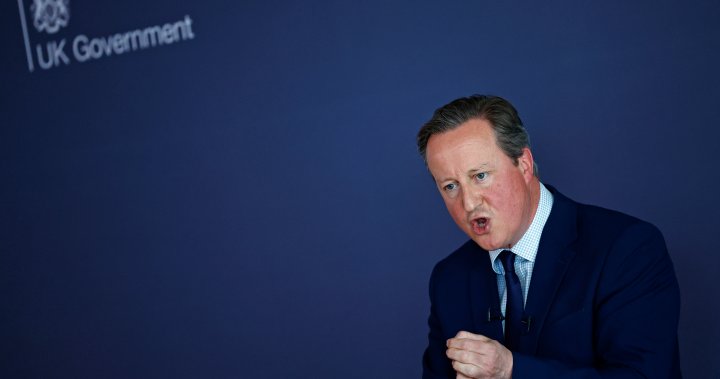Britain’s Foreign Secretary David Cameron is urging the U.K.’s allies, including Canada, to spend more on their militaries, warning the West needs a “harder edge for a tougher world.”
The current NATO target for defence spending is two per cent of GDP. Cameron wants it raised to 2.5 per cent.
Canada routinely misses the current benchmark, and last week Defence Minister Bill Blair signalled that it is unlikely to change in the immediate future, saying in a speech that it is “hard to convince people that that was a worthy goal.”

Cameron delivered a speech Wednesday, saying the war in Ukraine has shown that western democracies need to be “tougher and more assertive” in protecting their interests and values.
“If Putin’s illegal invasion teaches us anything, it must be that doing too little, too late only spurs an aggressor on,” he said.
The email you need for the day’s
top news stories from Canada and around the world.
The foreign secretary also pointed to Houthi attacks in the Red Sea, one of the world’s busiest shipping routes. When the Iran-baked Yemeni rebels ambushed commercial vessels, Cameron says most western democracies stood idly by.

“While many countries have criticized the Houthi attacks, it is only the U.S. and Britain that have been willing and able to step up and strike back at them,” he said.
British Prime Minister Rishi Sunak recently pledged to boost spending to 2.5 per cent by 2030.
Cameron’s speech was largely directed at the U.K.’s European allies, like Spain and Italy, which have failed to meet NATO targets despite an increasingly aggressive Russia.
“Some seem unwilling to invest, even as war rages on our continent,” the foreign secretary said.
But Canada is the only member of the alliance without a plan to reach the two per cent goal.
According to NATO estimates, Canada currently spends 1.33 per cent of its GDP on defence.
That number is expected to go up to 1.76 per cent by 2030, or $49.5 billion. The Department of National Defence’s budget last year was $26.9 billion.
Last Wednesday at a NORAD modernization conference in Ottawa, the defence minister said it’s hard to persuade voters and even his own colleagues of hitting NATO’s benchmark in the “current fiscal environment.”
“Trying to go to cabinet, or even to Canadians, and tell them that we had to do this because we need to meet this magical threshold of two per cent.… Don’t get me wrong, it’s important, but it was really hard to convince people that that was a worthy goal, that that was some noble standard that we had to meet [because] nobody knows what that means,” Blair said.
“Instead, we set out to make the argument about the need to defend this country and the need to invest in the Canadian Armed Forces, the importance of the work that they do.”
Blair added the spending increases the government has laid out for the military will, he thinks, put Canada on “an irrevocable path” of eventually reaching the two per cent NATO target.
–with files from The Canadian Press
© 2024 Global News, a division of Corus Entertainment Inc.




